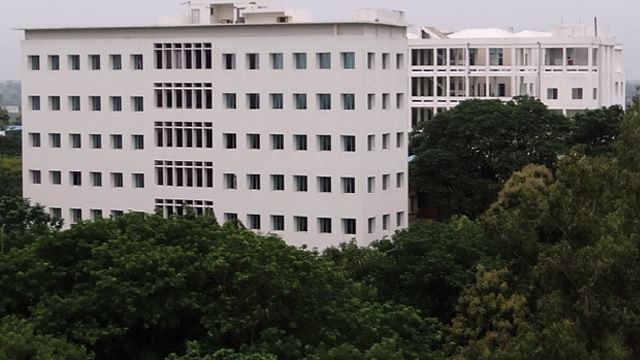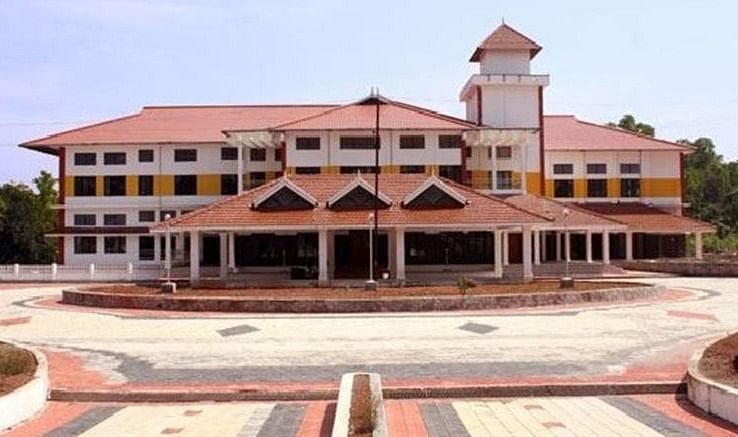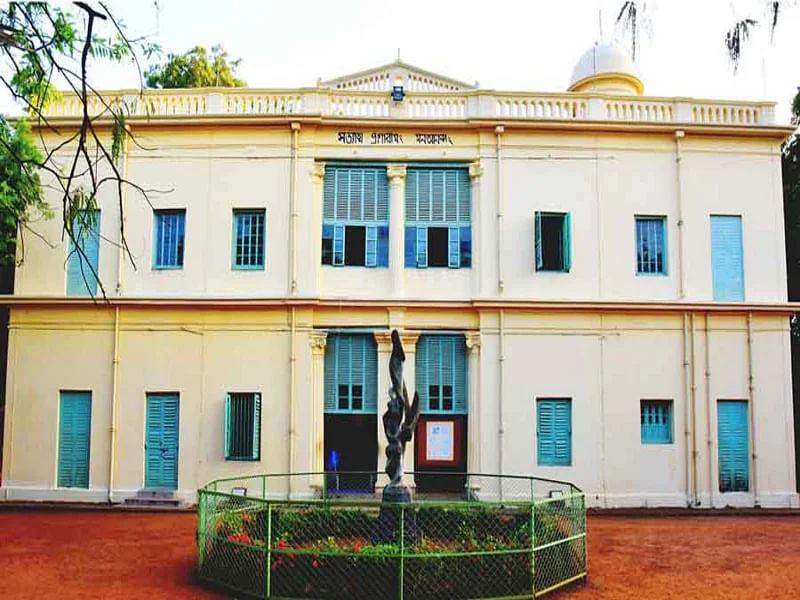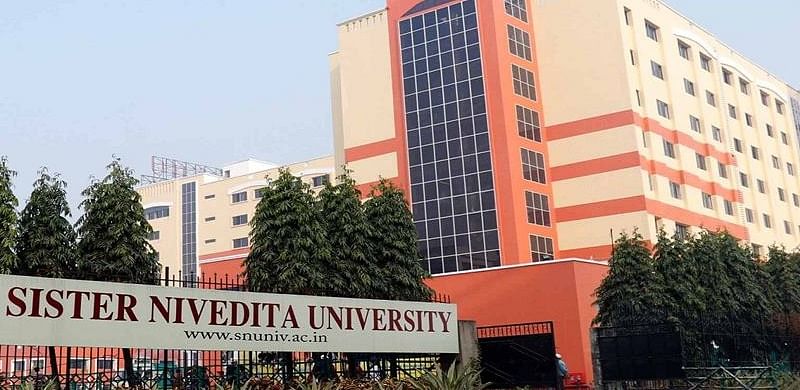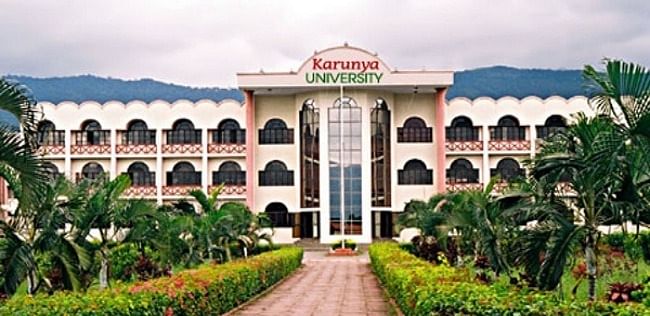BSc Agriculture: Course Details, Eligibility, Fees, Admission, Duration

BSc Agriculture is a four-year undergraduate science program that deals with multiple farming methods and the associated benefits of specific agricultural practices to increase productivity while reducing soil erosion and pollution. After completion of the degree, graduates can work as Agricultural Engineers, Food technologists, and Agriculture Development Officers in both public and private domains.
BSc Agriculture admission requires candidates to have a 50% aggregate in Higher Secondary (10+2) with Science Stream, and qualifying BSc Agriculture entrance exams such as MP PAT, BCECE, etc., based on the college requirements. The BSc Agriculture fee per year is in the range of INR 20,000 - 3,00,000 per year.
Table of Contents
- What is a BSc Agriculture Course?
- BSc Agriculture Eligibility Criteria
- Why Choose BSc Agriculture Course?
- BSc Agriculture Admission Process 2024
- BSc Agriculture Entrance Exam
- Top BSc Agriculture Colleges in India with Fee Structure
- Integrated BSc in Agriculture Course
- Bachelor of Science in Agriculture Syllabus and Subjects
- BSc Agriculture vs Diploma in Agriculture
- Courses After BSc in Agriculture
- Career Options After BSc Agriculture
- Salary of a BSc Agriculture Graduate
- BSc in Agriculture Scholarships
- Top 3 Cities to Pursue BSc Agriculture Course
- Skills To Excel as BSc Agriculture Graduate
BSc Agriculture Course Details
| Degree | Bachelors |
| Full Form | Bachelor of Science in Agriculture |
| Duration | 4 Years |
| Minimum Percentage | 50% in 10+2 from recognized board |
| Average Fees | INR 20,000-3,00,000 Per Year |
| Average Salary | INR 3.5-12 LPA (Source: Glassdoor) |
| Employment Roles | Agriculturalist, Agricultural Research Scientist, Agriculture Development Officer, etc |
What is a BSc Agriculture Course?
BSc Agriculture full form is Bachelor of Science in Agriculture, the course provides students with a comprehensive understanding of the various aspects of agriculture, including crop production, soil science, animal husbandry, and agricultural economics. This course falls under the umbrella of BSc.
The BSc Agriculture course duration is four years. BSc Agriculture syllabus is designed to provide students with a comprehensive understanding of agriculture, its principles, and practices.
BSc Agriculture job scope for graduates is vast, and they can enhance their knowledge and skills by working in varied industries or areas such as research organizations, labs, chemical firms, educational institutions, etc. The average BSc Agriculture graduate salary ranges from INR 3.5-12 LPA.
BSc Agriculture Eligibility Criteria
In order to get admission to BSc in Agriculture certain set of eligibility criteria needs to be met by the student which can differ according to college. Below mentioned are the standard BSc Agriculture eligibility criteria:
- The candidate should have passed 10+2 examinations from the science stream with a minimum of 50% marks for the general category and 5% relaxation is given to reserved category students. The student is also required to clear B.Sc Agriculture entrance exams like MP PAT, BCECE, etc.
- The BSc Agriculture age limit is a minimum age of 17 years and above.
Why Choose BSc Agriculture Course?
Before enrolling in any course it is important to understand the reasons and factors that influence the future scope of the course, like "What job opportunities are available", " What is the industry growth rate", etc.
Here are some of the following points to highlight why to choose the BSc Agriculture course:
- Global demand: The agriculture sector offers a reliable and promising career path due to the rising global need for food.
- Diverse topics: The course includes material on crop production, soil science, livestock management, plant pathology, and agronomy, which gives students a thorough understanding of the field of agriculture.
- Growth: The number of students choosing the BSc Agriculture course in India has significantly increased, according to the All India Survey on Higher Education (AISHE) report published by the Ministry of Education with a growth rate of 16.43% in the last five years.
- Career Opportunities: Besides traditional agriculture jobs, BSc Agriculture graduates can find employment in various sectors such as food processing, marketing, and agribusiness.
- Skill-Based Initiatives: The government has launched various skill development programs under NSDC to enhance the employability of agriculture graduates.
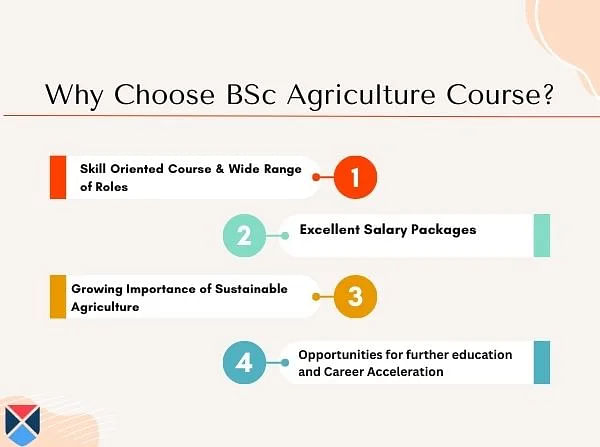
| Compare BSc Agriculture with BSc Horticulture |
BSc Agriculture Admission Process 2024
Getting admission for BSc Agriculture requires an aspirant to go through a fixed procedure, including group discussion, written entrance exams, etc. The BSc Agriculture admission process differs from college to college, but the general guideline is given below:
- Step 1: The BSc Agriculture admission process typically involves submitting online applications, the candidates can submit the application form online or offline.
- Step 2: Following the application deadline, qualified applicants are narrowed down based on their academic standing and might be invited to take an entrance test or an interview.
- Step 3: The final selection is made based on the candidate's performance in the entrance exam or interview, as well as their academic record.
- Step 4: Students need to provide valid documents for the document verification process after getting selected and completing the payment of the fee.
Read More: BSc Admission Process
BSc Agriculture Entrance Exam
The top BSc Agriculture colleges in India select the best candidates based on entrance exams. Some of the most popular BSc Agriculture entrance exams are listed below:
| BSc Agriculture Entrance Exams | Exam Dates | Accepting Colleges |
| BCECE | Jul 13-Jul 15, 2024 | Dr Kalam Krishi College, VKS College of Agriculture, Mandan Bharti Agriculture College |
| MP PAT | Jun 8- Jun 9, 2024 (Closed) | Sagar Institute of Research and Technology, Shri Vaishnav Institute of Management |
| ICAR AIEEA | Jun 29, 2024 (Closed) | Indian Agricultural Research Institute, Punjab Agricultural University, Tamil Nadu Agricultural University |
| AP EAMCET | May 16-May 23, 2024 (Closed) | Ideal Institute of Management and Technology, Andhra University |
Top BSc Agriculture Colleges in India with Fee Structure
BSc Agriculture fees vary from INR 20,000 - 3,00,000 per year, depending on the institute's facilities and services. Below are the fees for several well-known BSc Agriculture colleges that offer BSc in Agriculture course:
| College | Tuition Fees Per Year | Admission Fees | Miscellaneous Fees Per Year |
| Anbil Dharmalingam Agricultural College and Research Institute | INR 70,800 | INR 2,500 | INR 11,600 |
| Jawaharlal Nehru Krishi Vishwa Vidyalaya | INR 58,000 | - | INR 6,875 |
| TNAU | INR 50,000 | INR 5,000 | INR 9,000 |
| Vivekanand College of Agriculture | INR 65,000 | INR 3,000 | INR 10,000 |
| Dolphin Institute of Biomedical and Natural Sciences | INR 75,000 | INR 15,000 | INR 2,500 |
| Ramkrishna Bajaj College of Agriculture | INR 40,000 | INR 1,000 | - |
| Bharati Vidyapeeth Loknete Mohanrao Kadam College of Agriculture | INR 75,000 | INR 10,000 | INR 4,000 |
| Mewar University | INR 60,000 | INR 20,000 | INR 8,000 |
| Thanthai Roever Institute of Agriculture and Rural Development | INR 40,000 | INR 5,000 | - |
| Sai Nath University | INR 60,000 | INR 5,000 | INR 1,000 |
| RKDF University | INR 75,000 | INR 2,500 | - |
| Rai Technology University | INR 1,50,000 | INR 1,500 | INR 5,000 |
| Junagadh Agricultural University | INR 29,000 | INR 10,000 | - |
Read More: Top BSc Agriculture Colleges in India
Top 10 State-Wise BSc Agriculture Colleges in India
Below listed are the state-wise BSc Agriculture colleges in India:
| Location | Fees Per Year |
| Top BSc Agriculture Colleges in TamilNadu | INR 50,000- INR 70,000 |
| Top BSc Agriculture Colleges in Karnataka | INR 40,000-INR 75,000 |
| Top BSc Agriculture Colleges in AP | INR 50,000-INR 1,00,000 |
| Top BSc Agriculture Colleges in Maharashtra | INR 30,000-INR 70,000 |
| Top BSc Agriculture Colleges in Uttar Pradesh | INR 35,000-INR 75,000 |
| Top BSc Agriculture Colleges in Punjab | INR 40,000-INR 2,75,000 |
| Top BSc Agriculture Colleges in Uttarakhand | INR 20,000-INR 40,000 |
| Top BSc Agriculture Colleges in Madhya Pradesh | INR 25,000-INR 75,0000 |
| Top BSc Agriculture Colleges in Rajasthan | INR 30,000-INR 80,000 |
| Top BSc Agriculture Colleges in Kerala | INR 20,000-INR 50,0000 |
Integrated BSc in Agriculture Course
The five-year Integrated BSc in Agriculture qualification (BSc Agriculture + MBA in Agri-Business Management) in India combines academic study with hands-on instruction. The coursework is created to give students the abilities and information they need to seek a career in agriculture. Below mentioned are integrated BSc Agriculture course details:
| Eligibility | 10+2 with 50% minimum aggregate marks |
| Integrated BSc Agriculture Duration | 5 Years |
| Average Fees | INR 55,000 PA |
| Top College | VJU Jaipur |
Bachelor of Science in Agriculture Syllabus and Subjects
The BSc Agriculture syllabus will ensure a deep understanding of analytical skills, including research involved with information systems and technologies. BSc Agriculture program syllabus is mentioned below:
| Semester 1 | Semester 2 |
| Agronomy | Crop Physiology |
| Plant Biochemistry | Soil and Water Conservation Engineering |
| Soil Science | Agricultural Economics |
| Animal Husbandry | Microbiology |
| Forestry | Agricultural Extension Education |
| Horticulture | Food Science and Nutrition |
| Agricultural Botany | Agro-Meteorology & Climate Change |
| Semester 3 | Semester 4 |
| Plant Pathology | Fundamentals of Plant Genetics |
| Entomology | Plant Disease Management |
| Seed Technology | Crop Production Technology |
| Crop Production Technology | Soil Management |
| Farm Management | Nematology |
| Soil Resource Inventory | Applications of Nanotechnology |
| Farm Machinery and Power | Agricultural Chemistry |
| Semester 5 | Semester 6 |
| Plant Breeding |
Agricultural Finance
|
| Agricultural Marketing | Agro Informatics |
| Agricultural Microbiology |
Organic Farming
|
| Horticultural Crops |
Plant Biotechnology
|
| Post-harvest management |
Crop Improvement
|
| Soil Fertility Management |
Agricultural Extension
|
| Agricultural Economics | Electives |
| Semester 7 | Semester 8 |
| Farming System & Precision Farming | Village Attachment |
| Soil Fertility Management | Plant Clinic Attachment |
| Agro-Industrial Attachment | Modules for Skill Development |
| Plant Clinic Attachment | Projects/Reports |
| Unit Attachment | Electives |
| Projects | - |
| Electives | - |
Read More: BSc Agriculture Syllabus & Subjects
BSc Agriculture vs Diploma in Agriculture
BSc Agriculture course is that it makes graduates prepared to make knowledgeable choices about farming methods, land use, and agricultural policy. Diploma in Agriculture focuses on practical skills related to farming and agriculture practices.
Below is a comparison between the BSc in Agriculture and the Diploma in Agriculture:
|
Course |
BSc Agriculture |
Diploma in Agriculture |
|
Full Form |
Bachelor of Science in Agriculture |
Diploma in Agriculture |
|
Stream |
Science |
Science |
|
Duration |
4 years |
1 -2 years |
|
Eligibility |
10+2 with PCB as a major combination with 50% as the total aggregate |
10+2 with 50% as the total aggregate |
|
Entrance Exams |
BCECE, PAU CET, JCECE,etc. |
AP POLYCET, TS POLYCET,etc. |
|
Top Colleges |
Visvha Bharati, Chandigarh University, Amity University |
Agriculture University, Aryans Degree College |
|
Fees Per Year |
INR 20,000 - 3,00,000 |
INR 10,000-50,000 |
|
Job Roles |
Agronomist, Agricultural Officer, Plantation Manager, Agricultural Consultant, and more. |
Agricultural Assistant, Field Officer, Crop Advisor, and more. |
|
Average Salary |
INR 3.5-12 LPA |
INR 1.8-3.5 LPA |
Read More: Diploma in Agriculture
| BSc Agriculture Vs B.Tech Agricultural Engineering | BSc Agriculture vs B.Pharmacy |
Courses After BSc in Agriculture
Students who choose BSc Agriculture have a vast scope for higher education. An aspirant can pursue a Ph.D. or take the ARS (Agriculture Research Service) examination after graduation. If an aspirant wants to pursue a career in management, The aspirant can enroll in MBA/PGDM agribusiness programs at IIM A, IIM L, Symbiosis, BHU, and NIAEM.
Listed below are some other courses for higher studies:
Career Options After BSc Agriculture
Over the last few years, there has been an increase in the demand for skilled professionals in agriculture. Because of technological advancements, there is a modernized revolution in agriculture and such specialists and knowledgeable professionals.
Listed below are some of the career options in this field along with top hiring companies:
|
Job Designations |
Job Description |
Hiring Companies |
| Agricultural Consultant | Offer services like farm management and strategies to grow the business through sustainable practices | ITC Limited, DuPont India, Monsanto India |
| Agronomist | Provide advice to farmers and companies regarding crop management and farming practices | ICAR, Mahyco, Syngenta India |
| Agricultural Officer | Looks after compliance practices and ensures the business is conducted within the set rules and regulations | NABARD, IFFCO, State Agriculture Departments |
| Seed Production Manager | Look after the processing, production, and seed distribution | National Seeds Corporation, Kaveri Seed Company |
Salary of a BSc Agriculture Graduate
The average starting salary of a BSc Agriculture graduate is around INR 3.5-12 LPA [Source: Glassdoor]. Many factors like graduation from college, geographic location, academic performance, etc., determine an aspirant's salary. Given below are the BSc Agriculture graduate salary details for various job roles:
| BSc Agriculture Job Roles | Average Entry Level Salary (INR) | Salary After 5+ Years of Experience (INR) |
| Biochemist | 3,50,000 - 5,00,000 | 8,00,000 - 12,00,000 |
| Food Scientist | 3,00,000 - 4,50,000 | 7,00,000 - 10,00,000 |
| Agricultural Engineer | 4,00,000 - 6,00,000 | 10,00,000 - 15,00,000 |
| Agronomy Sales Manager | 4,50,000 - 6,50,000 | 12,00,000 - 18,00,000 |
Read More: BSc Agriculture Salary
Top Recruiters for B.Sc Agriculture
Below listed are a few top recruiters for BSc Agriculture graduates:
| National Seeds Corporation | ICAR (Indian Council of Agricultural Research) | IFFCO (Indian Farmers Fertiliser Cooperative) |
| NABARD (National Bank for Agriculture and Rural Development) | ITC Limited | Monsanto India |
| Mahyco (Maharashtra Hybrid Seeds Company) | Rallis India Limited | Dhanuka Agritech Limited |
| Godrej Agrovet | PepsiCo India | Nestle India |
| Bayer CropScience Ltd. | Syngenta India | DuPont India |
| UPL Limited (formerly United Phosphorus Limited) | Hindustan Unilever Limited (HUL) | Kaveri Seed Company |
BSc in Agriculture Scholarships
For students seeking a BSc in Agriculture degree, there are many scholarships available. These grants can pay for living costs, housing costs, and tuition. Below mentioned are BSc Agriculture Scholarships:
- The India Agri Fellowship
- University of Edinburgh International Scholarship for Agricultural Science
- Netaji Subhas-ICAR International Fellowships
- Profugo Field Fellowship
- UAS Bangalore Sharan Vedanth Scholarship
- Shri. R.N. Lakshmipathi and Smt. Nagarathnamma, Gauribidanur Merit Scholarship
- Smt. Swarnamba. TK. Gurusiddapa Scholarship
- Late Sri. A. Gopal Endowment Scholarship
Read More: Best Agriculture Courses after 12th
Top 3 Cities to Pursue BSc Agriculture Course
Below listed are the top 3 cities to pursue a BSc Agriculture course based on top colleges, average living expense, top recruiters, and average starting salary:
|
Cities |
Top Colleges Offering BSc Agriculture Courses |
Average Living Expense (INR) |
Average Starting Salary (INR) |
Top Recruiters |
| Delhi | Indian Agricultural Research Institute, Delhi University, Amity University | 15,000 - 25,000 | 3,00,000 - 4,00,000 LPA | National Seeds Corporation, KRBL Limited |
| Bangalore | University of Agricultural Sciences, Christ University, Bangalore University | 15,000 - 20,000 | 3,50,000 - 4,50,000 LPA | Namdhari Seeds, United Genetics India Pvt. Ltd |
| Hyderabad | Professor Jayashankar Telangana State Agricultural University, Osmania University | 12,000 - 18,000 | 3,00,000 - 4,00,000 LPA | Nuziveedu Seeds, Prabhat Agri Biotech Ltd. |
Skills To Excel as BSc Agriculture Graduate
BSc Agriculture duration is 4 years during the course, students acquire practical, theoretical, and skill-based knowledge. Listed below are some skills that graduates learn throughout the course:
- Forward Planning
- Initiative
- Flexibility
- Good communication
- Analytical skills
- Commercial awareness
- IT skills
- Marketing & Sales Skills
Top BSc Agriculture Colleges
Top Agriculture Entrance Exams
BSc Agriculture Fee Structure
FAQs on BSc Agriculture
Q: Does BSc Agriculture course require NEET score?
Q: What is the future after BSc in Agriculture?
Q: What is BSc Agriculture course duration?
Q: Can I do BSc Agriculture course if I am from a non-science background?
Q: What is the scope of BSc Agriculture in the Private Sector?
Q: What is the scope of BSc in Agriculture?
Q: What is the salary of BSc Agriculture in India per month?




